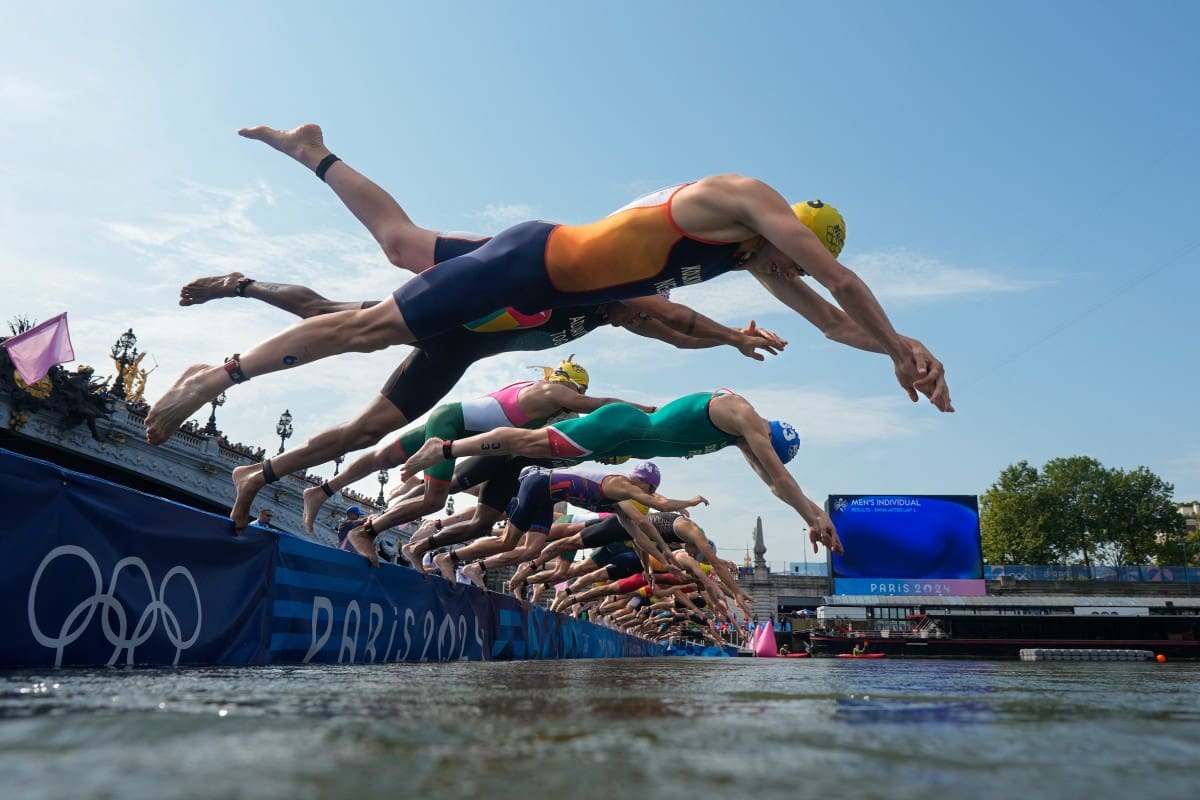
Photo by David Goldman / POOL / AFP
After a postponement, the Paris 2024 Olympic Games triathlon event scheduled to take place in the Seine finally went ahead on Wednesday, July 31st. Several athletes condemned the way that the event had been scheduled with scant regard for their health and their work, with no thought to the medium- and long-term consequences. In the interests of staying ‘on message’ the competitors were caught up in a dangerous experiment.
The suitability of the River Seine as a venue dismayed the sports delegations, French and foreign alike. The anger of Spanish triathlete Miriam Casillas was clearly expressed to the local press, in an interview in which she denounced the lack of consideration for the health of the athletes:
Here, they’ve thought more about the stage, the image, making it look good and selling it in the Seine. No thought has been given to the health of the athletes. If they had thought about the health of the athletes, it wouldn’t have been done here and there would have been a real plan B. They’ve had eight years to prepare for the Games, and every year it gets worse. It’s a shame. It’s better to say it and not keep quiet.
Her words are all the firmer because she is a doctor by profession, so she takes an uncompromising medical view of her experience. A triathlon spent in such conditions involves treatments and antibiotics, the taking of which can seriously jeopardise a sportsman’s career. Casillas denounced the dubious nature of the tests carried out 24 hours later than planned—in her opinion, deliberately, since they were carried out before an episode of heavy rain likely to degrade the quality of the water, so as not to jeopardise the staging of the event.
We’re a bit like circus clowns, they put us there and we have to get through it,.
Belgian swimmer Jolien Vermeylen was also unhappy with her experience. “When I swam under the bridge, I felt and saw things that you shouldn’t think too much about. The Seine has been dirty for a hundred years, so they can’t say that the safety of the athletes is a priority. That’s bullshit,” she told Belgian television. The sportswoman is lucid about the pressure the organisers put themselves under, meaning they couldn’t back down once they had made their crazy decision:
If the race hadn’t taken place, it would have been a disgrace for the organisation, for Paris, for France.
The inconvenience of swimming in the river added to the frustrations of the previous days. Felix Duchampt, a member of the Romanian delegation, didn’t appreciate the postponement of the event, and the physical and mental strain caused by the multiple procrastinations of the Olympic organisation. “I didn’t think it was a crazy thing.”
Even more spectacular was the misadventure that befell Canadian triathlete Tyler Mislawchuk, who vomited a dozen times after his race in the Seine. “An Olympic star vomits on live television after being forced to swim a race in the polluted Seine,” comments a photo from the British media outlet Unilad. But he and his team did not make the connection with the pollution of the river. “Tyler threw up because he was pushing himself to the limit, which happens in endurance sports, especially in extreme heat. This has absolutely nothing to do with the Seine and he’s not ill. He’s 100% fine.” Despite these denials, the suspicion surrounding Mislawchuk’s ‘technicolor yawn’ was palpable.
The final word goes to Jolien Vermeylen, who concludes of the 2024 triathlon, bluntly: “It was a dud.”
